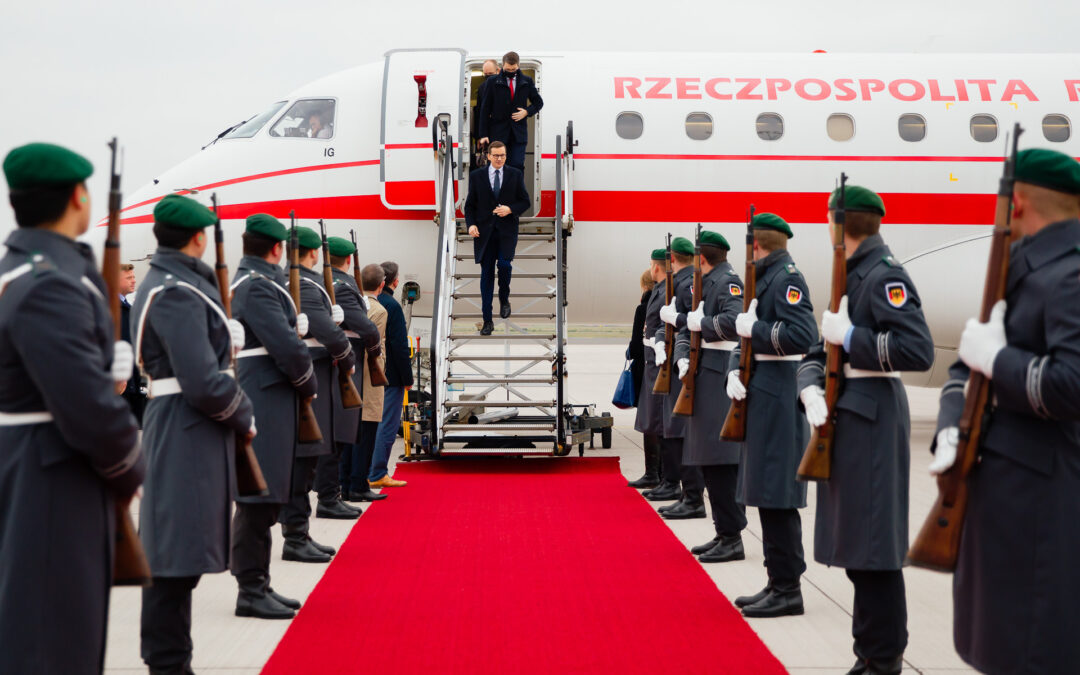Poland will continue to press Germany for war reparations, the prime minister has said during a visit to Berlin. Meanwhile, a leading newspaper reports that Germany’s new coalition government is likely to be more open to Poland’s claims than its predecessor was.
Poland’s national-conservative ruling Law and Justice (PiS) party has long argued that the country is still owed huge amounts – potentially hundreds of billions of dollars – in reparations.
The Nazi German occupation of Poland resulted in millions of deaths, the almost complete destruction of many cities, as well as large-scale looting of art and other cultural heritage.
Asked by German Press Agency dpa whether the Polish government’s recent “quietness” on the issue meant that its claims were now off the table, Prime Minister Mateusz Morawiecki denied that this was the case. “Poland was treated in a very bad way, not receiving reparations,” he noted.
Morawiecki said that last Monday he signed the decision on setting up a state Institute of War Losses. It will be named after Jan Karski, the Polish resistance fighter who acted as a courier to the Polish government-in-exile and its allies, bringing them information about the situation in German-occupied Poland.
“This institute will institutionalise our efforts to analyse all the losses but also analyse the approach which we are going to take concerning reparations,” the prime minister explained.
In a Facebook post yesterday, Morawiecki added that “our good relations and cooperation demand that Poland should be treated fairly and receive compensation” for the wartime damage. “I believe that we will manage to come to an agreement in this matter.”
The plans to set up the institute were revealed last month by PiS MP Arkadiusz Mularczyk, chairman of the parliamentary commission tasked with calculating how much Germany owes Poland.
Two and a half years ago, Mularczyk announced that his commission’s report was ready and had been sent to the government and president. However, since then it has not been published. Mularczyk has previously told media that the bill would amount to around $850 billion.
In his interview with dpa, Morawiecki said that the commission has been asked to to add further information to the report by February. It will then be “presented to the public at a later time” he said, without specifying further. “We are preparing everything needed to present this report to the external world.”
German commentator Sven Felix Kellerhoff, writing for the Die Welt daily, said that the establishment of the Polish institute could be “explosive” because of the likelihood that the new German foreign minister will be Green Party politician Annalena Baerbock.
Last year, Baerbock’s party colleague Manuel Sarrazin, at the time the head of the German-Polish parliamentary group but who is no longer an MP, criticised Germany’s “rather ignorant handling” of the reparations issue, Kellerhoff notes.
At the time, Sarrazin argued that, while the German government’s position against reparations may be legally correct, it is “morally and politically unacceptable” and that “Germany cannot consider the debate to be over if it is not over for our Polish partners and friends, who were the first victims of the German attack”.
Mularczyk himself recently noted that the new German coalition government meant that the time was right for a return to the issue of reparations. “Both the Greens and the Free Democratic Party are groups with which there is a possibility of dialogue on this matter,” he told the Wprost weekly.
Kellerhoff notes that previous German governments have rejected calls for reparations for four reasons: first the terms of the Potsdam treaty of 1945, whereby the Soviet Union committed to meeting Poland’s demands, then the communist Polish government relinquishing claims in 1953.
Third, Poland accepted the terms of the Two Plus Four Agreement on the reunification of Germany in 1990 as well as, fourth, the Treaty of Good Neighbourship and Friendly Cooperation with its newly reunified western neighbour the following year.
The latter agreement resulted in a total of 2.5 billion deutsche mark coming into Poland, including payments to former forced wartime workers.
Main image credit: Krystian Maj/KPRM (under CC BY-NC-ND 2.0)

Ben Koschalka is a translator, lecturer, and senior editor at Notes from Poland. Originally from Britain, he has lived in Kraków since 2005.




















